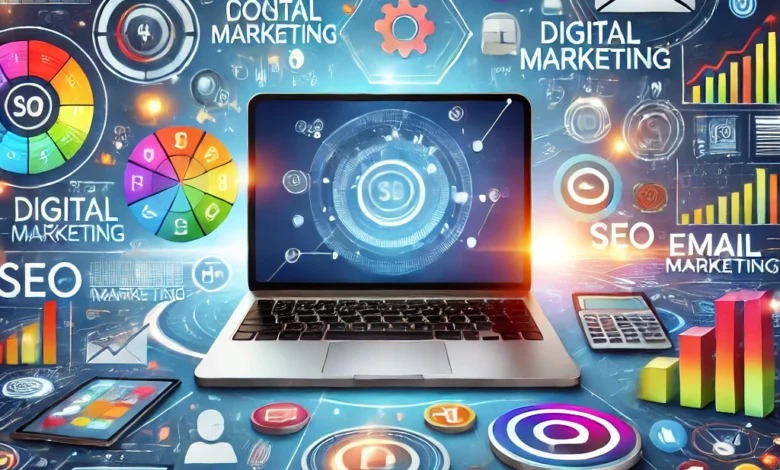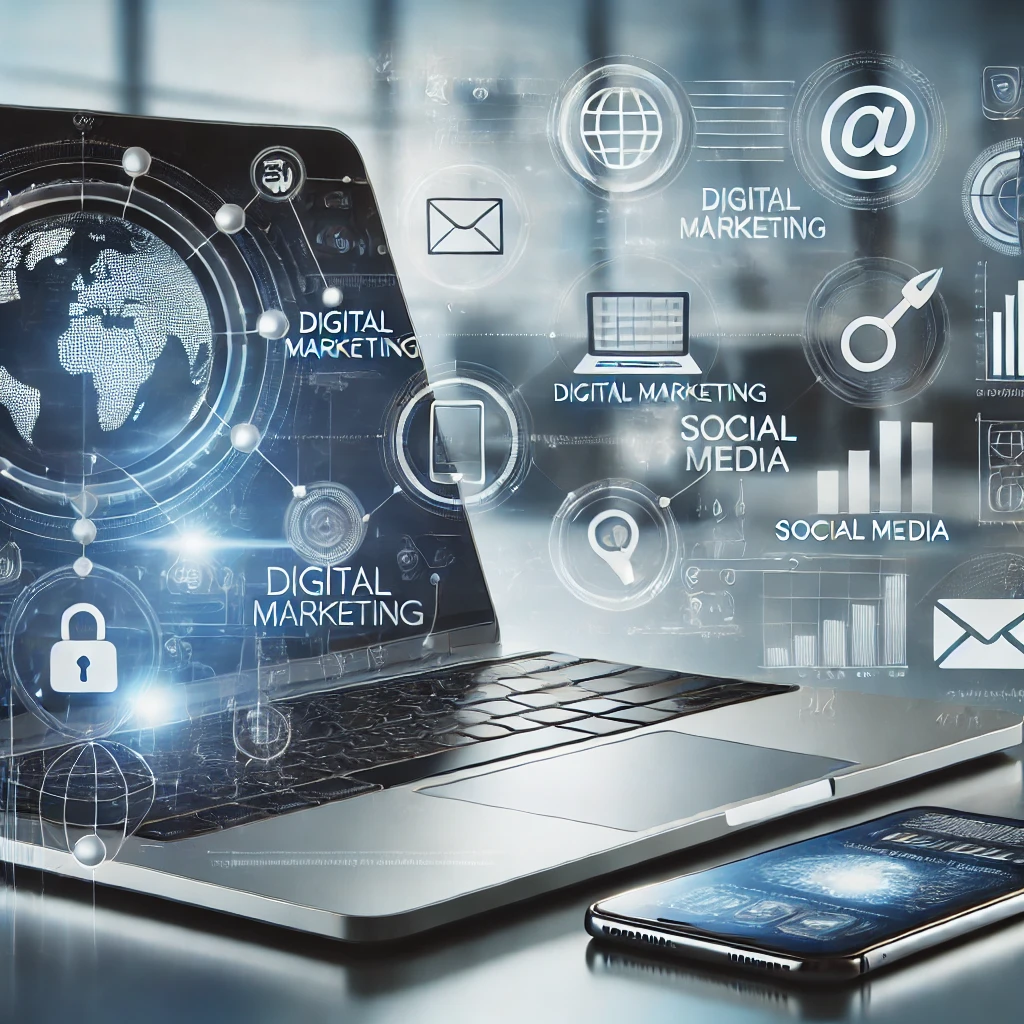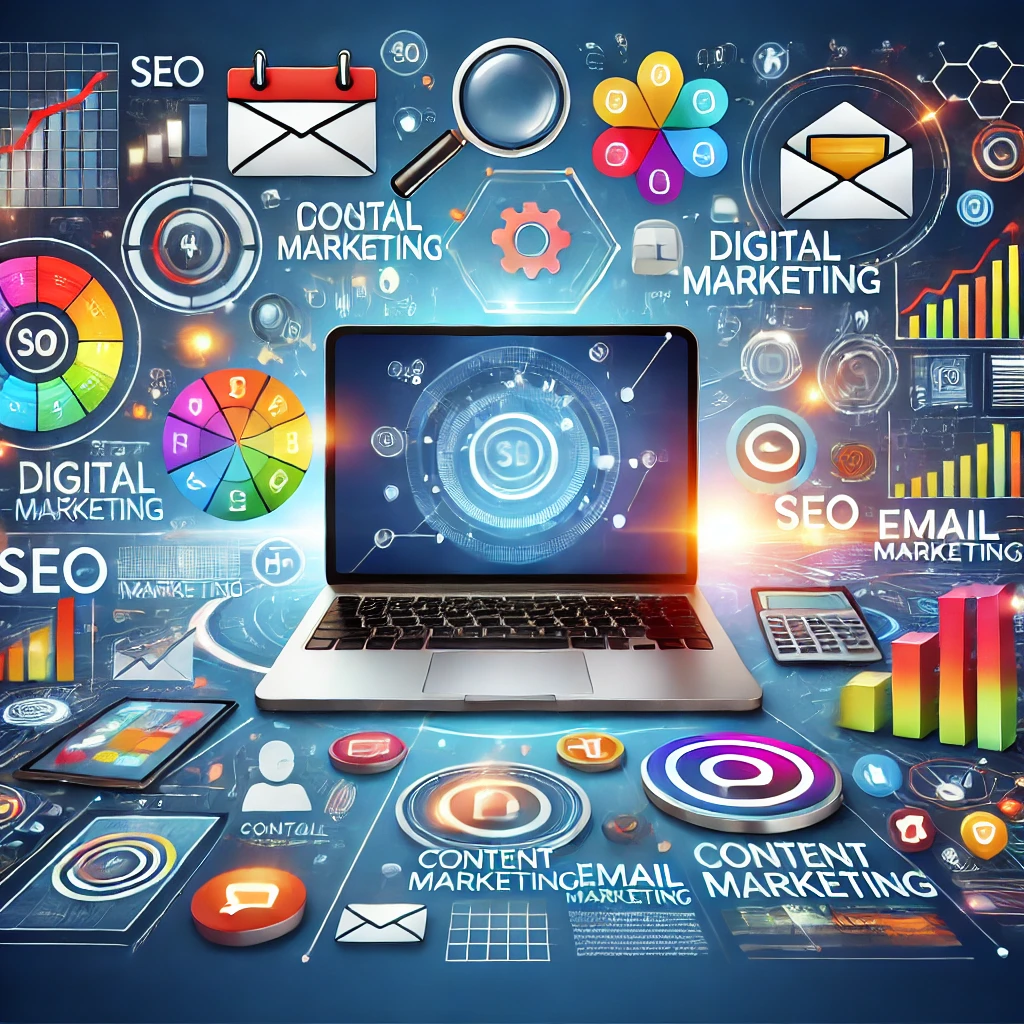Unlocking the Power of Digital Marketing: Strategies for Success in the Modern World

Digital Marketing: A Comprehensive Overview
In the modern era, businesses rely heavily on digital marketing to reach and engage their target audiences. As more people use the internet for shopping, research, and entertainment, digital marketing has become an essential tool for businesses of all sizes. This article provides a comprehensive overview of digital marketing, covering its key aspects, strategies, and benefits, as well as how businesses can leverage it to achieve success.
What is Digital Marketing?
Digital marketing refers to the promotion of products or services through digital channels such as websites, search engines, social media, email, and mobile apps. Unlike traditional marketing, which relies on mediums like print, TV, and radio, digital marketing allows for direct interaction with consumers in a more targeted and measurable way. Businesses can use various online platforms to engage customers, create brand awareness, and drive conversions.

Key Components of Digital Marketing
- Search Engine Optimization (SEO)
SEO is the practice of optimizing a website to rank higher in search engine results pages (SERPs). It involves improving website content, structure, and technical aspects to make it more appealing to search engines like Google. By using relevant keywords, creating quality content, and building backlinks, businesses can increase their organic traffic and visibility. - Content Marketing
Content marketing involves creating and distributing valuable, relevant content to attract and engage an audience. This content can take the form of blog posts, videos, infographics, or eBooks. The goal is to provide useful information that helps consumers solve a problem or make a decision, which in turn builds trust and encourages them to interact with the brand. - Social Media Marketing
Social media platforms like Facebook, Instagram, Twitter, LinkedIn, and TikTok have become powerful tools for reaching potential customers. Businesses use social media to build communities, share content, and promote their products. Social media marketing involves both organic efforts, such as posting regularly and engaging with followers, and paid strategies like running ads targeted to specific demographics. - Pay-Per-Click Advertising (PPC)
PPC is a digital advertising model in which businesses pay a fee each time their ad is clicked. Google Ads is one of the most popular PPC platforms, allowing advertisers to bid on keywords and display their ads at the top of search results. Other platforms, like Facebook Ads and Instagram Ads, allow businesses to target users based on their interests, behavior, and demographics. PPC offers quick results and measurable ROI, making it a popular choice for businesses looking to drive immediate traffic. - Email Marketing
Email marketing remains one of the most effective forms of digital marketing. It allows businesses to reach customers directly in their inbox with personalized messages. Whether it’s a promotional offer, a newsletter, or a product update, email marketing can help nurture leads and maintain customer relationships. By using segmentation and automation, businesses can send targeted emails to specific audience groups, ensuring higher engagement. - Affiliate Marketing
In affiliate marketing, businesses partner with third-party affiliates who promote their products or services in exchange for a commission on sales. Affiliates use various methods, including blog reviews, social media, and email campaigns, to drive traffic to the business’s website. Affiliate marketing can be a cost-effective way to reach new audiences, as businesses only pay when a sale is made. - Influencer Marketing
This strategy involves partnering with influencers—individuals with large and engaged followings on social media platforms. Influencers promote a business’s products or services to their audience, leveraging their credibility to build trust. This form of marketing is particularly effective in industries like fashion, beauty, and fitness, where visual appeal and personal recommendations carry weight. - Mobile Marketing
With the growing use of smartphones, mobile marketing has become essential. This involves optimizing websites for mobile devices, developing mobile apps, and using SMS or push notifications to engage users. Mobile marketing ensures that businesses can connect with their audience at any time, regardless of their location. - Analytics and Data Tracking
One of the advantages of digital marketing is the ability to track and analyze data. Tools like Google Analytics, social media insights, and email marketing platforms allow businesses to monitor their campaigns in real time. By analyzing metrics such as traffic, conversion rates, and user behavior, businesses can make informed decisions and refine their strategies for better results.

Benefits of Digital Marketing
- Cost-Effective
Compared to traditional marketing methods, digital marketing is often more affordable and allows businesses to control their budget more effectively. Small businesses can compete with larger companies by focusing on niche markets and using targeted advertising to reach their ideal customers. - Global Reach
With digital marketing, businesses are no longer limited to their local markets. They can reach a global audience, expanding their customer base and increasing brand awareness across different regions. - Measurable Results
One of the biggest advantages of digital marketing is the ability to track results in real-time. Whether it’s through SEO rankings, PPC performance, or social media engagement, businesses can see what’s working and what isn’t. This data-driven approach allows for continuous optimization and improved return on investment (ROI). - Targeted Marketing
Digital marketing platforms offer sophisticated targeting options, enabling businesses to reach specific demographics based on factors such as age, gender, location, interests, and online behavior. This ensures that marketing efforts are focused on the right audience, increasing the likelihood of conversions. - Flexibility and Scalability
Digital marketing campaigns can be easily adjusted and scaled based on performance. If a particular strategy is working well, businesses can allocate more resources to it. Conversely, if a tactic isn’t delivering results, it can be modified or paused without wasting a significant budget.
Conclusion
Digital marketing is a powerful tool that enables businesses to connect with their target audience, build brand awareness, and drive conversions in a cost-effective and measurable way. By leveraging a combination of SEO, content marketing, social media, PPC, and other digital strategies, businesses can create personalized, engaging experiences that resonate with consumers. As technology continues to evolve, businesses that invest in digital marketing will have a competitive advantage in the marketplace.


